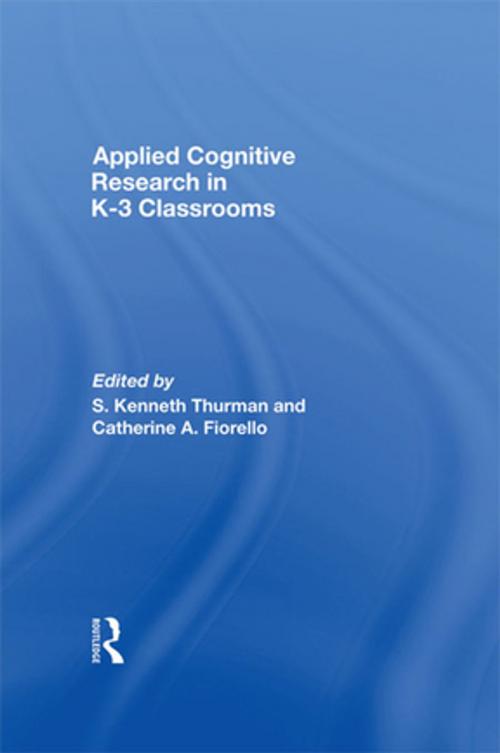Applied Cognitive Research in K-3 Classrooms
Nonfiction, Reference & Language, Education & Teaching, Elementary| Author: | ISBN: | 9781135597320 | |
| Publisher: | Taylor and Francis | Publication: | April 4, 2014 |
| Imprint: | Routledge | Language: | English |
| Author: | |
| ISBN: | 9781135597320 |
| Publisher: | Taylor and Francis |
| Publication: | April 4, 2014 |
| Imprint: | Routledge |
| Language: | English |
This volume summarizes research on important topics in cognitive research and discusses what must be done to apply this research in early elementary classrooms. Purposefully, it focuses on areas of cognitive research that have only recently begun to be studied in early elementary classrooms or that, based on educational and psychological theory, appear to have the greatest implications for early classroom learning
-
Part 1, "Cognitive Applications in Early Elementary Classrooms," examines topics germane to the cognitive functioning of young children: working memory, executive functioning, theory of mind, phonemic awareness, and neuropsychological processing in the context of early elementary classrooms.
-
Part 2, "Considerations for Further Research: Methods, Policy, and Issues," looks at practical and methodological issues of which applied cognitive researchers must remain cognizant: methodology, research designs, the gap between science and policy and means by which this gap can be diminished, and the need to consider how issues like ecological validity, individual differences, treatment integrity, and the relation between assessment and intervention are integral to designing applied cognitive research studies.
The current emphasis on empirically supported treatments and research-based teaching and intervention in the schools, and legislation such as No Child Left Behind and the Individuals with Disabilities Education Improvement Act, have focused attention on the scientific basis of educational practice. However, applying research to the environment of the schools is not an automatic process. Bridging the gap has several prerequisites: researchers must attend to the ecological validity of their studies, universities must incorporate the results of research into their pre-professional training programs, and schools must support their inservice staff in developing new knowledge and skills. Applied Cognitive Research in K-3 Classrooms contributes strongly to these goals, not only by providing researchers, professionals, and graduate students in the fields of cognitive psychology, school psychology, educational psychology, educational research, and early elementary-level education with current understanding but also helping to set an agenda for further research that applies cognitive psychology in early elementary classrooms.
This volume summarizes research on important topics in cognitive research and discusses what must be done to apply this research in early elementary classrooms. Purposefully, it focuses on areas of cognitive research that have only recently begun to be studied in early elementary classrooms or that, based on educational and psychological theory, appear to have the greatest implications for early classroom learning
-
Part 1, "Cognitive Applications in Early Elementary Classrooms," examines topics germane to the cognitive functioning of young children: working memory, executive functioning, theory of mind, phonemic awareness, and neuropsychological processing in the context of early elementary classrooms.
-
Part 2, "Considerations for Further Research: Methods, Policy, and Issues," looks at practical and methodological issues of which applied cognitive researchers must remain cognizant: methodology, research designs, the gap between science and policy and means by which this gap can be diminished, and the need to consider how issues like ecological validity, individual differences, treatment integrity, and the relation between assessment and intervention are integral to designing applied cognitive research studies.
The current emphasis on empirically supported treatments and research-based teaching and intervention in the schools, and legislation such as No Child Left Behind and the Individuals with Disabilities Education Improvement Act, have focused attention on the scientific basis of educational practice. However, applying research to the environment of the schools is not an automatic process. Bridging the gap has several prerequisites: researchers must attend to the ecological validity of their studies, universities must incorporate the results of research into their pre-professional training programs, and schools must support their inservice staff in developing new knowledge and skills. Applied Cognitive Research in K-3 Classrooms contributes strongly to these goals, not only by providing researchers, professionals, and graduate students in the fields of cognitive psychology, school psychology, educational psychology, educational research, and early elementary-level education with current understanding but also helping to set an agenda for further research that applies cognitive psychology in early elementary classrooms.















